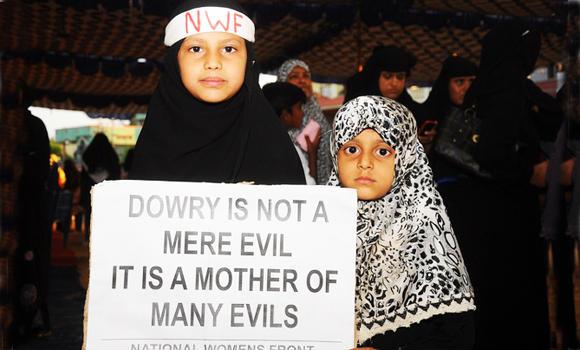
Jeddah, Sep 4: Muslims should stick to Islamic teachings and shun the dowry system, Indian expatriates in the Kingdom have said in reaction to reports that the incidence of domestic violence in their country has worsened because of dowry disputes.
Women’s rights activists on Tuesday, citing statistics from of the National Crime Records Bureau, said 8,233 Indian women died at the hands of their husbands’ families because of disputes over dowry payments made by the brides when the marriage takes place. That's one woman killed every hour.
Aleem Khan Falki, an activist campaigning against dowries and the founder of Socio Reform Society Jeddah, told Arab News on Tuesday that dowries were once deemed a “social evil” but have now affected the “morale, economy and all social values” of India.
“NCRB statistics should astonish the world. In this age of education and technology, could India be such a savage country that it burns one woman to death every hour?” he asked.
Dowry demands can continue for years after the wedding. Thousands of young women each year are burned to death after being doused with petrol because the groom or his family believed the dowry was not sufficient.
“The worse effect of the dowry is that the parents have to spend every single penny of their savings on the dowry of the daughters and leave nothing for the sons,” said Falki. “The sons have no other option except adopting lower and contemptuous professions like auto driver, peons, sweepers or tea boys.”
Indian law bans the centuries-old custom, yet the practice continues unabated and country’s justice system has only a 32 percent conviction for dowry related crimes.
A group called the 50 Million Missing Campaign, laments that dowry in India today "has become the No. 1 method of criminal extortion through the infliction of blackmail, torture, violence, and murder of women."
"Every son born into a family is greedily viewed as the ‘golden goose’ who will bring in the fantasized wealth through the dowry they will demand when he gets married. So families want more and more sons. There is no end to the wealth demand even after marriage, and if the woman is killed, the son can marry again. For another dowry! Why kill, why not just divorce? In the case of divorce, there is always the chance that the woman or her family will demand their dowry money/items back.
"The families that are consumed with hoarding dowry, are the same ones that also do not want to pay dowry to other families. Hence, not only do they torment and kill women who marry into their families, but they destroy daughters in their own families through selective female feticide, infanticide and the killing of toddlers through starvation and deliberate neglect," the campaign said.
Abdul Raouf, an Indian who works in Jeddah, said dowries are considered "haram" or forbidden in Islam and there would be no disputes if all Muslims follow such rule.
“It is true that the dowry system has become a big problem for everyone regardless of religion,” he said. Especially in Islam it's not allowed according to Shariah, but people in India and Third World countries don’t follow these law.”
Dr. Sayeed Haroon, a Jeddah-based consultant, said the dowry system would remain unless community leaders and religious schools spread awareness about the deadly practice.
“It’s not only the problem of Muslims but all the religions in India,” Haroon said. “In our religion simple marriages are the best marriages according to Qur’an and Sunnah, but people are going in wrong directions. Because of this, many young girls are sitting at home and not getting married on time and going astray or committing suicide.”






.jpg)
.jpg)
Comments
Add new comment